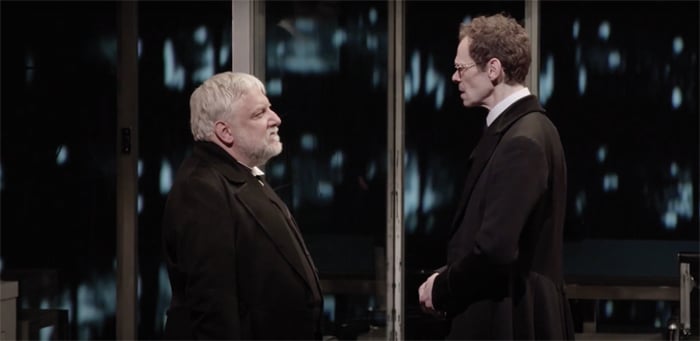 Simon Russell Beale and Adam Godley in “The Lehman Trilogy” Screenshot from YouTube
Simon Russell Beale and Adam Godley in “The Lehman Trilogy” Screenshot from YouTube Jewish history is complicated. A favorite song of mine that satirizes our messy existence in the Old World is Daniel Kahn’s “The Ballad of How the Jews Got to Europe,” which uses Yiddish and unconventional instruments to drum up feelings of chaos. The final line of the tune is:
“The prince needs men? The new world slaves? Have we got stuff to sell! We are the middle men of Europe’s modern earthly hell…”
Such is the story of the Jews. For centuries, our position in society has been, on many occasions, that of the salesman; the people designated as bargainers between the Christian world and the Muslim world, forced to be comfortable with borrowing, lending, and redistributing wealth. This was ultimately a method of survival for the Jewish people, who understood that in order to avoid persecution, being useful to the majority in your respective country was a smart strategy. The “middle man mindset” followed us across the ocean in the eighteenth and nineteenth centuries and into the new world, and provides important context for the drama of the Lehman Brothers, three Jewish men who started with next to nothing but by the dawn of the twenty-first century had established one of the largest investment banks in the world.
Several weeks ago, I attended a performance of The Lehman Trilogy, a three-act play that presents the lives of the first Lehmans to arrive in America: Chaim, changed to Henry upon arrival; Mendel, changed to Emmanuel; and Meyer. These men punctuate their sentences with “Baruch Hashems” (thank God), they keep kosher, they hang mezuzahs on their doors, and they observe all the laws of shiva when there is a death in the family. Yet I found the first act difficult to watch, not in spite of the brothers’ Jewishness, but because of it. The Lehmans began their climb to the top of American wealth in Alabama, working as mediators between white slave owners and northerners who desired their precious cotton. The Lehmans seem to have no moral reservations about their work, but rather consider themselves using a country’s political and economic apparatus — no matter how corrupt and depraved — for their own survival. We don’t see a racist before us when Meyer sets out to win the investment of plantation owners, we only see a Jew who is doing what he can to make ends meet in a strange land. The Jews in audience sitting in front of me, beside me and behind me were no doubt uncomfortable, yet what we were viewing was the truth.
The Lehman Brothers were drunk on changing what it meant to be Jewish, and if I can’t say I’m comfortable with this new American intoxication, perhaps I at least understand it.
When the Civil War tears America apart, the Lehmans encounter severe challenges in order to change their business model and survive financially. They succeed, winking at the Jewish European proclivity to remain standing even as nations annihilated each other in bloody strife.
The second act is no less disconcerting. As the first generation of Lehmans die off, their children seek to intensify their economic domination by moving to New York and exploiting the fruits of the Gilded Age of oil tycoons and robber barons. The family becomes increasingly less religious, allowing the allure of the newly-opened New York Stock Exchange to replace Judaism as their spirituality of choice. Whereas the Lehman business used to shutter its doors for an entire week to honor a deceased brother, it now only closes for a few days in order to not disrupt business. The expanding country is an irresistible opportunity to invest in rail, in cars, and in factories. Of course, on the other side of the coin is crippling poverty in American cities, the rise of Jim Crow, and exploitation of the working class leading to huge income inequality. None of this seems to matter much to this family of former huddled masses yearning to breathe free – now seizing every opportunity presented to them.
In the third and final act, the Great Depression rattles the country. Banks slip and fall, stock brokers commit suicide, and the well of money the Lehmans drank from begins to dry up. In a daring climax, Bobby Lehman, the grandson of Emmanuel and now head of the company, works through unthinkable odds to change the company once again. He pivots, with much risk, to surviving industries: radio, weapons of war, and entertainment. He succeeds; only now, the Lehman business only closes its doors for two minutes when a family member has died. Judaism has officially evaporated from their lives. In the penultimate scene where scenery spins behind him, Bobby manically dances, faster and faster as he grows older and older and as America grows more absurd and discombobulated. The play ends in 2008, when Lehman Brothers officially declared bankruptcy as a financial crisis shook the halls of power once more.
The narrative is complicated, but through both the good and bad, in the richest and in the poorest of us, it is the story of finding a safe harbor in success.
As I left the theatre, I asked myself why, when I certainly did not feel any admiration for these men, did I feel sympathetic toward their characters and wanted them to overcome their obstacles? They were, at almost every turn, not the most compassionate or ethical people. Was it simply because they were Jews? No, it was far more sentimental than that. This play began in the 1840’s and concluded with a historical event I myself remember. And through it, we see the ways in which Jews have created and altered history, not least their own. Our traditional position of subjugation in Europe made the United States our playground — from humble tenement homes we soon outgrew to the top of the economic and political pyramid. The Jewish people epitomize perhaps the most romantic yet complex expression of the American dream: Rags to riches, with all of the struggles and ethical compromises that inevitably go with it.
Lehman Brothers Inc. should be condemned for its involvement in the abhorrent businesses of slavery, of colonialism, of polluting the planet. But I found myself getting chills in the last moments of the play, when the company finally goes up in smoke, and the original brothers retake the stage to recite a haunting Kaddish. The curtain closed, and I realized what propelled us, and mandated us, to get ahead and stay ahead: the fear and paranoia and sense of death following us for two millennia. The Lehman Brothers were drunk on changing what it meant to be Jewish, and if I can’t say I’m comfortable with this new American intoxication, perhaps I at least understand it.
I saw in the faces of The Lehman Brothers selfishness and greed, yet all the same, the same face of my great grandfather who walked up and down the streets of Manhattan each day humbly looking for work. His family remained observantly Jewish, organized labor strikes, sent their children to public school, and voted for progress and equality on their ballots. Yet his story and the Lehman story both create the Jewish narrative of the middleman in America. The narrative is complicated, but through both the good and bad, in the richest and in the poorest of us, it is the story of finding a safe harbor in success.
Blake Flayton is New Media Director and columnist at the Jewish Journal.























 More news and opinions than at a Shabbat dinner, right in your inbox.
More news and opinions than at a Shabbat dinner, right in your inbox.